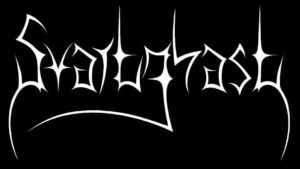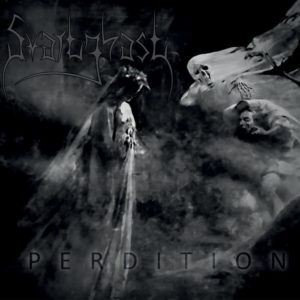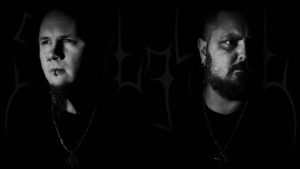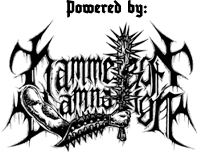Here we present a conversation with Choronzon, creative mind behind the great Swedish Symphonic Black Metal project SVARTGHAST. Check it out now.

Could you tell us a little more about Svartghast background ?
Back in 2017, I (Choronzon) met Azazel when the band he was playing in then, did a gig at the place where I work. We started talking and found out that we had a lot in common, regarding music and bands we liked, and especially black metal. So, we started to talk on a regular basis and the idea to create music together was born.
We met up in August that year, in Azazel’s studio, with a lot of beer and no real plan, but with the intention of writing some black metal together. So we locked ourselves in the studio over one single night and wrote, recorded and mixed our first song, “Luciferian Dawn”, which is also the last song on our debut album. Naturally, we re-recorded it for the album, but that first raw demo-version of the song isn’t that far off from the one of the album. Those interested in listening to it can find it on our SoundCloud page: https://soundcloud.com/svartghast
After that song was done, we knew we had to explore this further and the symphonic black metal act that now is SVARTGHAST was born.
“Perdition” is the debut album from 2020. Tell us how it was getting done in that the pandemic covid-19 had its outbreak. Did it affect your plans anyhow?
We actually worked on the album for 2,5 years before it’s release, so once the pandemic began in february/march 2020, we were already starting to mix the album. So no, the pandemic didn’t affect our process or our plans, other than on the label-side of the release. Dusktone is an Italian record label and during the spring of 2020, Italy suffered pretty hard from Covid-19, which I am sure postponed a lot of planned releases.
First of all, the production is great! Awesome work in the drums and voices. The craft of the albums seems that you had a lot of time to make sound like it should be. What were the challenges you faced during the recording of the album?
Thank you very much, we are very satisfied with how it all ended up. From the start, we had an idea for the production to pay respect to the sound of the black metal of the 90’s, but with a modern touch to it, and from what we have heard from fans, reviews and the like, we succeeded.
As mentioned, we spent 2,5 years working on the album, but even though we live 10 minutes from each other, both Azazel and I work irregular hours. So, we had to find a way to work around this and ended up working almost entirely over the internet. We got a cloud storage service and started to upload ideas and sketches for the pre-production. Then, when we had a chance to meet up physically, we arranged the pieces into more song-like structures.
We didn’t really have a plan for an album, nor did we have any deadlines set, which was great when we started out. We had the freedom to explore odd ideas, write whatever came to mind, without having any pressure to deliver anything to anyone. Of course, this also had drawbacks, especially in the form of actually finalising anything. When we got our record deal, we only had a few songs written. We had more material and ideas, but we really had to step up, regarding arranging and finalising it into actual songs.
As a Symphonic Black Metal band, what are your main influences? If you could name a band that you have been influenced by so far, which one would you name and why?
For my own part, if I had to name just one band, I would say EMPEROR. Not that I would call them “symphonic”, but pretty much everything I write in this genre is inspired by EMPEROR. When I first heard their debut, “In the nightside eclipse”, back when it was released, I was in total awe. That album is, for me, the template for how 90’s black metal should sound and I still return to it for inspiration and motivation.
I know Azazel has found a lot of his inspiration from the earlier works of DIMMU BORGIR, but also bands like DARK FUNERAL and SATYRICON. But there are many bands, especially from that era, that have been an inspiration to us.
The thing is, it is very difficult to pinpoint a single source of inspiration and influence, especially with such a vast collection of bands to choose from.
 “Perdition” was released by Dusktone from Italy. How has this partnership started? Have you worked with them before? Have you ever thought about being independent?
“Perdition” was released by Dusktone from Italy. How has this partnership started? Have you worked with them before? Have you ever thought about being independent?
When we started writing, we didn’t have any ambition other than to write music together and maybe put it online for the public to hear. But in the fall of 2019, we decided to send out some hooks to a few select labels, just to see if it sparked some interest. We sent out a handful of emails, to maybe 7-8 labels, without having material for a full album and only rough vocals recorded on one of the pre-prod songs. The labels we chose were labels we had heard good things about, some were labels I had been working with before, others were labels friends with bands had recommended. We didn’t really expect any replies and those few who did reply were not particularly interested.
However, after quite some time, we got an email from Dusktone who explained that our mail had gotten stuck in their junk mail filter and that they were interested in listening to more of our material. So we started a dialogue with them that ended in them offering us a contract that we found satisfactory.
We are very pleased with Dusktone, it is a label that is very dedicated to not only our music, but to all of their bands music. They have a good artist roster with strong and talented musicians.
Who is responsible for the cover of “Perdition”? Tell us what the art cover is about?
“A kísértetek órája” is a painting by Hungarian artist Mihály Zichy. It was painted around 1880 and depicts a woman in what can only be described as a nightmarish place, surrounded by death and darkness.
At first, we had an idea of using a photograph for the cover, but we couldn’t really find a suitable motif. So we started to search for other sources and came across this painting. It really sang to us, depicting the perfect atmosphere to our vision and since it is public domain, we saw now reason not to use it.
Later, we learned that it has been used by another band as well, but we don’t really care. It is a beautiful painting and it fits our album perfectly.
You started up Impious in 1994. What have changed in you musicwise since then?
Well, to be perfectly clear, I started a death metal band named IMPIOUS in 1994, we released 2 demo tapes in the mid 90’s. That band is not the same IMPIOUS that released several full length albums.
But yes, before I joined SETHERIAL (1996-2007), I was more into death metal than black metal. In a way, I still am more of a death metal fan, there is just something with old school death metal that makes me smile.
When it comes to music in general, both listening, writing and playing, it is an ever changing process that is always evolving, from one day to the next. I have done so many different things within music and I am still learning, developing my skills and adapting my technique, even after 30+ years of playing guitar and writing music.
“The Black Wraith Ascends” is a great piece of music. And the next one “On Dark Wings They Soar”, we have a symphonic song, but you slowed down a bit, but in my opinion it is one of the most interesting songs in the album. Tell us a little about the concept among the songs, are they connected?
Actually, “The Black Wraith Ascends” was written with the intention of it being the “outro” for side A of the vinyl, while “On Dark Wings They Soar” was the perfect beginning of Side B, with its mellow and melodic intro, featuring a harp as the first choice of instrument. We intentionally wanted to bring forth instruments on the album that weren’t considered “right” for black metal. Harp is such an instrument, perhaps due to the common perception of the harp being an celestial and angelic instrument, at least in a lot of imagery around the world. There are a few other odd instruments in other songs on the album that one probably wouldn’t have chosen in the first place.
“On Dark Wings They Soar” also features a guest vocal appearance from Mishbar Bovmeph of MEPHORASH, who not only nailed his performance vocal-wise, but his choice of vocal style also added to the atmosphere and feeling of the song and album. We are very grateful for having him as a guest, as well as we are grateful to Memnock of ABYSSIC/SUSPERIA/ANITQVA who lent us his abysmal voice on “Into The Void”.
However, the songs on the entire album are not connected at all, lyrically, other than they all depict visions and imagery of Hell, the apocalypse and Lucifer.
When it comes to the lyrics, I have always steered clear of outright satanic concepts in my lyrics, because I have always felt others have done a better job writing such. But, after “Luciferian Dawn”, I felt I needed to explore that side of lyrics more, so the decision was made to stay within that subject for the “Perdition” album.
How is your creative process? Which comes first? The lyrics or the arrangements? And how Azazel contributes in them?
In SVARTGHAST, it usually starts with writing riffs or pieces, be it on guitar, piano or orchestral sketches. As mentioned, we work over the internet, me in my studio and Azazel in his. We have a cloud storage service where we share our work and when we have a chance to meet up physically, we do sessions when we arrange our riffs in rough arrangements. This is an ongoing process that isn’t finished until we begin the final recordings. Lyrics and vocals are most often the last pieces of the puzzle, before the final recordings.
I am very lucky to have found a very talented co-founder in Azazel. Not only do we share a similar vision, but we are both multi-instrumentalists and we both write music, as well as we both have our own recording studios. Often, my riffs work perfectly with his and vice versa.
We, of course, have different strengths and weaknesses, but we both have an equal share of writing material, arranging it and recording it. Azazel is an exceptional musician and composer, and is as much responsible for the sound of SVARTGHAST as I am.
What band or albums have you been listening to nowadays?
I have been trying to find new inspirational sources, since I recently joined a newly started black/death band. So there has been quite some obscure and dark stuff spinning these days, stuff I normally wouldn’t listen to, like SPECTRAL VOID, TEMPLE NIGHTSIDE and QRIXKUOR.
But I also love the progressive and dark symphonic music of DEVIL DOLL, which is an everlasting source of inspiration to me. I often return to listening to the album “Dies Irae”, which was their last one, released in 1996.
Even though I most often return to listening to older stuff, I still try to find new music and bands. The years of pandemic have certainly given people a chance to do just that and there is a lot of great music out there for anyone to discover. I would like to point out a few bands in different genres, bands like HARKANE, ILD, HOGSTUL, LIVLØST, MAESTITIUM and VITAM AETERNAM. These are new bands (new to me, at least) that I have found to be very interesting, these last years. Go check them out.
Is Svartghast similar to any other projects you have or this is the first Symphonic band you have ever played in? And why Symphonic Black Metal?
I have always tried to implement orchestral/symphonic material in my own music and bands, where it has been possible. Most often, it has not been possible, due to the genre of the band. SETHERIAL, for instance, may be considered melodic or even atmospherical at times, but that band rarely used synth/orchestral elements. In CHAOSDAEMON, we used a little more of those, but it still wasn’t symphonic, in my opinion.
One needs to understand that the quality of symphonic sounds and sample libraries is a lot higher today than it was just 10 years ago. Back in the 90’s, we needed to rely on hardware synths for any symphonic elements and decent sounding synths could cost a fortune. Today, you can get a sample library of a good sounding full orchestra for less than tenth of the cost of a decent sounding synth in the 90’s. So, of course, with technological evolution comes better opportunities to create symphonic material, for those of us without access to a real live orchestra.

Aside from SVARTGHAST, I am the vocalist of a Norwegian death/doom band, which is also symphonic/orchestral, albeit not like traditional symphonic metal. The band is called OMNIA MORITUR and the debut album “Ex Inferis”was released early 2022. I am also working on a solo album, which is based in black metal, but with a lot of inspiration from other genres. It will definitely be symphonic and orchestral, to a certain degree, as well as it will contain elements of a more experimental and industrial kind. This is a project I am working on between freelance production work and writing for my bands, so I don’t want to go public with a project name or release any teasers just yet. It is kind of nice to work without the weight of a deadline hanging above my head, but I hope there will be a physical release of this project, once I am ready to release it.
We know Sweden is the High-quality place for metal bands. How has the Swedish scene influenced you?
Not only the Swedish scene, but the entire Scandinavian scene has certainly made a mark in metal history, and I would be lying if I claimed it has had no influence on me. Everything, from playing styles and techniques, to sound and content, has certainly contributed to my style of writing, playing and producing music, without doubt. Of course, there have been other sources of inspiration as well, but one can not dismiss the impact Scandinavian metal has had on myself and also the rest of the world.
Having been a part of the Swedish scene since the 90’s, I also consider myself a contributor to it. Perhaps I have not been especially influential or made any heavier impacts on it, but still I have put my work out there and perhaps been a source of inspiration for someone else.
Besides music, are there any books that have influenced you or movies? I asked you this because of the passages in “The Presage of Eternal Fire”. It really looks like a quotation from a book. And the intro of ” The Fall of the First” has a lot of elements from classical Music.
Everything around me is an inspiration, be it music, literature or movies. A scene from a movie, a strophe in a book, just about anything can light up a spark of creativity. “The Presage of Eternal Fire” has no quotes from any works of literature that I am aware of, however I do tend to write lyrics in a somewhat descriptive “poetic”/”prose” style, so I take your thoughts about it as a compliment.
When it comes to “The Fall of the First”, Azazel sent me a video clip of a piano piece he
had been working on (which can be viewed on our social media pages) and I immediately could hear the orchestra, guitars, drums and vocals in my head. So we recorded it, but we weren’t really sure we should include it on the album, due to it being so different from the other songs. It’s the only song on the album, with a progressive feel, a guitar solo and clean vocals.
In the end, we decided to include it anyway, but not as a last song because we felt that people might think of it as an “album filler” if we put it last in order, and it is certainly not a song we just added for that purpose. And I am glad we did include it, because it is a really good song. One reviewer even called it “one of the most beautiful Black Metal songs of all time”, which might be a stretch, I don’t know. But it is a song we are very proud of, it sticks out on the album and surely surprises some listeners who did not expect a piece like that.
Thanks for this interview, Whats coming next in the Svartghast saga ? If you could send us a message it would be great!
We’re working on new material and hopefully we will have something to present soon
Thank you for your interest and support.
Hails to those who deserve it.















